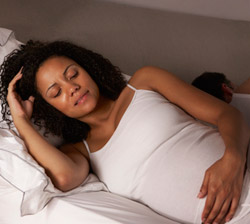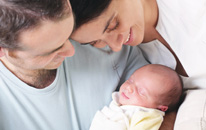Four Common Pregnancy Sleep Problems and Solutions

New mothers know they aren’t going to get much sleep for the first few months after their baby is born. So it’s important that they get as much rest as possible leading up to their due date. The problem is, pregnancy can lead to a lot of sleep difficulties including abnormal sleeping patterns and restless leg syndrome, according to SleepMed, a sleep disorder center in Santa Barbara.
As in all stages of life, quality sleep is essential for the health of both an expectant mother and her unborn baby. Yes, hormones and a changing body make it difficult to get a decent night’s sleep, but there are ways to ease the burden.
Changing Hormone Levels
Researchers from the the National Sleep Foundation have long pointed to changes in hormones as a main cause of sleep problems in women. These changes take place during adolescence, menopause — and of course — pregnancy. Rising levels of progesterone can be particularly problematic, leading to daytime sleepiness for women in the first trimester. Unfortunately, this is a problem women just have to deal with, for higher levels of progesterone are important to the fetus’ development. Avoid the temptation to take excessive daytime naps, as these will only make it harder to sleep at night.
Increased Stress
Stress is a common cause of insomnia at all stages of life, and pregnancy is not exempt. Although the prospect of adding a new member to the family is exciting, it also can cause quite a bit of stress if you feel you are ill-prepared to welcome a child into the world. The Anxiety and Depression Association of America suggests that those struggling to sleep due to stress practice a regular, relaxing bedtime routine, or, if that doesn’t work, give meditation a try.
Growing Pains
In the second and third trimesters, most sleep problems result from discomfort resulting from a growing belly. Those go-to sleep positions are not going to cut it anymore, particularly if you’ve traditionally made a habit of sleeping on your stomach. First though, you’ll want to check that your mattress is sufficiently supportive. If you’ve struggled with a subpar mattress prior to your pregnancy, the problem is only going to get worse while you’re expecting. Your best bet is to invest in a mattress delivery from a department store or specialty mattress shop to ensure restful sleep. It really does make a difference.
Once you have a supportive mattress, consider switching up your sleeping position. The American Pregnancy Association recommends sleeping on your stomach with your knees bent. If you still need additional abdomen support, WebMD experts suggest supplementing the position with a few well-placed pillows.
Lack Of Exercise
At one time, it was widely believed that women should be as still as possible while pregnant, avoiding exercise at all costs. While strenuous exercise is still not recommended, today’s experts believe moderate workouts promote improved health in expecting women. Additionally, the incorporation of moderate exercise into your daily routine may have a profound impact on your sleep patterns, making it easier to fall and stay asleep at night and reducing the impulse to nap during the day. KidsHealth recommends at least half an hour of active movement four days a week, although ideally, not during the 2 to 3 hours prior to bedtime.




